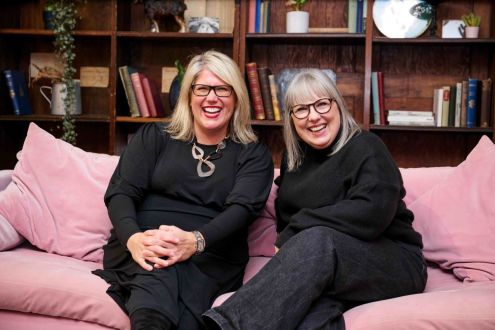Ditch the diet, take control of your life
Feeling good about yourself has nothing do to with being thin, says psychotherapist Sophie Boss of Beyond Chocolate. So ditch the diet and take control of your life

A lot of the work you do with women on overeating at Beyond Chocolate is about asking them to evaluate their relationship with their bodies rather than with food. Why?
I know from my own experience that women often blame their bodies for everything, and that creates a cycle of blame, overeating and putting on weight. The way women speak about their bodies is shockingly cruel. We have one exercise where we ask women to assign labels to different parts of their bodies and the words they use – ‘flabby’, ‘gross’, ‘disgusting’, ‘vomit-inducing’ – are horrifying. But ironically, the more you hate the body you have, the less likely you are to be able to change it.
Do we have to learn to love our bodies before we can change them?
For us, the emphasis is on treating your body with respect and kindness, but it’s unrealistic to suggest that you need to ‘love’ every inch of it before you can move on. What we’ve found more effective is if you can say, ‘I may not love my body right now. I may not even like it particularly, but I’m willing to look after it, clothe it properly, to treat it with compassion and live in it, rather than live in the future.’
What does that mean?
It’s the idea at the root of why most diets are so popular, but don’t work. We are encouraged by the diet industry and the media to think about what we want to look like, what we want to achieve, what we want to be. I’m not suggesting it’s bad to have ambitions but the goals most of us have about body image encourage us to put everything on hold until that time when we look perfect, and therefore our lives will be perfect.
But what’s wrong with visualising an ideal self?
Nothing, but there’s a huge disparity between what we will really look like if we lose the weight we’re agonising over, and how we’re encouraged to think about our perfect self. A 45-year-old woman who’s size 22 doesn’t see what she’d really look like at size 10, with folds of excess skin. She imagines a taut body that’s 20 years younger, a completely different shape. Even if you do lose weight, you keep aiming for more – you have to look even slimmer, smoother, more toned. There’s always something we’re aiming for when we’re shaping how we look, before we get to what we want. Because we never get there.
Logically, we know all this, but we still find the promise of a ‘miracle’ diet irresistible.
Many women have a vested interest in holding on to it because if they get to their ideal weight and nothing changes then they’re really stuck. In fact, many women do get there and nothing changes, so it’s not surprising they put the weight back on.
Are women aware of where their attitudes have come from?
We look at the way women’s bodies are represented in the media. Even though we’re seeing more photo shoots with larger women, their skin is still impossibly lustrous and smooth. On a personal level, examining where your attitudes have come from doesn’t necessarily help you move forward.
How can we change our approach?
The most effective thing we can do is to learn to treat our bodies with kindness. It sounds simple, but most of us have a punishing attitude towards our body. How many times have you said, ‘I’ll have to force myself to cycle/run a mile/ ignore the biscuits’? Would you force someone else to do that, or tell her that her thighs were disgusting? We think we can be thin because we’re told constantly that it’s easy, if we put our mind to it. So we put all our efforts into wanting to change our size or our shape rather than our job or our relationship. We hold on to the idea of being thin because feeling good about ourselves seems like a huge task in comparison to losing half a stone. What we’ve seen over and over is women who come to a workshop and make lots of changes, but still they focus on all the things they haven’t done. When they start to appreciate all the great things they’ve achieved, they begin to see themselves through compassionate eyes.








